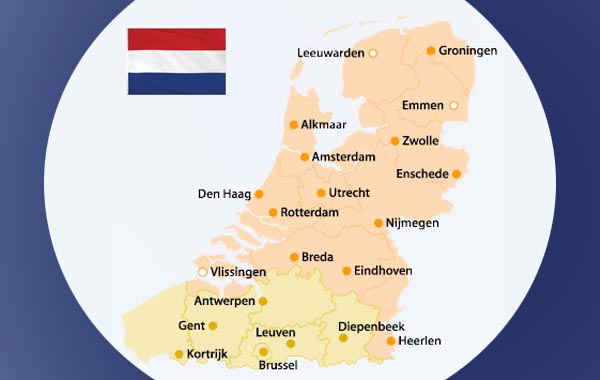1. The main language of Belgium

If you live in Wallonia, the French speaking part of Belgium, it is not always obvious that Dutch is the mother tongue of 2 out of 3 citizens of Belgium. Although most Belgian citizens deem it essential that the people of this bilingual country be able to communicate with each other in French and in Dutch, they do not always act accordingly.
Most Flemish people can answer in French if you talk to them, as you probably found out during your holidays on the Belgian coast in Knokke or Ostend, but it would be much better for this country if the communication could take place both ways on even terms.
Taking Dutch classes in Brussels will allow you to benefit more when visiting Flanders and its magnificent historical sites, such as Antwerp and Ghent. You will be able to build friendships with people in Flanders and you will find out you have a lot in common.
A bilingual society will strengthen the bonds of this country and assure its future.
The fact that you can also talk to everybody in the Netherlands is a nice bonus.


2. Bigger than you think

There are about 34 million people in the world that speak Dutch as their mother tongue.
Most of these people live in Holland and Belgium, as you might have guessed. But Dutch is also an international language, spoken in America, Asia and Africa.
In central America, Dutch is the official language in Surinam and on the Dutch Caribbean Islands of Curaçao, Aruba, Bonaire and Saint-Marten. Nice places to take Dutch classes… especially in the wintertime!
Dutch is also spoken as a second language in countries like Indonesia, a former Dutch colony. Although Dutch is no longer an official language in that vast country, it is still spoken by many citizens, especially amongst the older generation.
The Dutch language has left its mark in Africa as well. In South-Africa, the continent’s dominant economic power, Afrikaans is one of the official languages. Afrikaans can be considered a dialect of the Dutch language. It developed its own characteristics that are different from the mother language, but it is still easy for a Dutch speaker to understand and vice versa.
3. Career opportunities
At our language school, we see al lot of people at the beginning of their professional career.
They obtained their degree and now they are looking for – or have recently found – a job in a large national organisation that offers interesting opportunities for professional advancement.
At work they are suddenly confronted by the need to master the Dutch language. Many of their colleagues are from Flanders and the companies they work for have a national marketing strategy.
They see that the people in top positions are all multilingual and that speaking Dutch fluently is essential to move up.
The situation in the capital is the most striking. “In Brussels, half of job offers demand knowledge of Dutch, but only one job seeker out of five confirms they have an average knowledge of the other language,” says Jan Gatz, the spokesman of Actiris. That is a very good reason to take Dutch classes in Brussels.
And let’s not forget that the unemployment rate in Flanders is considerably lower than in Wallonia. If you can communicate reasonably well in Dutch, you could find a job in Flanders if you don’t live far from the linguistic border.
It is our vocation to help people boost their language skills as well and as fast as possible so that they can develop their true potential to the full.
4. Quality education

The education system in Flanders and in Holland are among the very best in Europe, as shown repeatedly in studies of the Programme of International Student Assessment (PISA) by the OECD, the Organisation for Economic Co-operation and Development.
The success of Dutch speaking secondary schools amongst French speakers in the region of Brussels Capital is proof of this. Many French speaking parents send their kids to these schools in search of the best possible education.
The same can be said about the language immersion schools in Wallonia that have been mushrooming since the year 2000. There are now over 178 immersion schools where part of the school curriculum is taught in Dutch.
These schools offer young people better prospects for future development in general. The fact that they thus become bilingual or even trilingual (because the level of English is much higher in Flemish schools) enhances their opportunities considerably in this multilingual country.
Many of the parents of these teenagers come to take Dutch lessons at our language school, since they want to talk to teachers and other parents they meet.
It is never too later to take Dutch classes in Brussels! So, what are you waiting for? 😉

